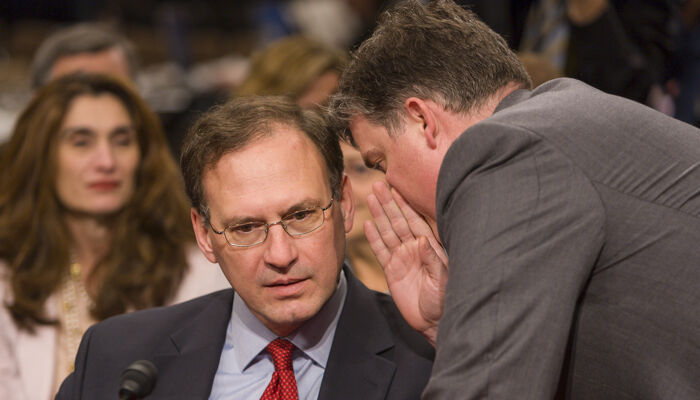Justice Samuel Alito believes that the rights of jurors who hold homophobic views are being infringed upon by the legalization of same-sex marriage.
Sign up for more LGBTQ+ news and updates at TrueQueer.
In a recent Supreme Court case, Justice Samuel Alito issued a controversial opinion that has sparked discussion and raised concerns about the intersection of religious beliefs, LGBTQ+ rights, and the justice system. The case involved Jean Finney, a lesbian woman who sued her employer, the Missouri Department of Corrections, for discrimination. During jury selection, three potential jurors expressed homophobic views and Finney’s lawyers requested their exclusion from the jury due to their biased views. The judge agreed, citing concerns about their impartiality.
Finney was ultimately successful in her lawsuit and awarded $275,000 in damages. However, the Missouri Department of Corrections appealed, arguing that excluding the jurors violated their 14th Amendment right to equal protection under the law. They claimed that the jurors were simply expressing their religious beliefs and that their exclusion was discriminatory based on their religion. They sought to expand the protections of the 14th Amendment to include religion as a basis for juror exclusion.
The case reached the U.S. Supreme Court, where Justice Alito declined to hear it for technical reasons but still issued an opinion. In his opinion, Alito argued that excluding jurors based on their religious beliefs was a form of discrimination and that this was a result of marriage equality becoming legal in all 50 states in 2015.
Alito expressed concern that individuals with traditional religious views on sexual morality were being unfairly labeled and marginalized by the government. He referenced Obergefell v. Hodges, a case that legalized same-sex marriage, as a catalyst for this perceived discrimination against Christians who oppose homosexuality.
Critics of Alito’s opinion noted that the jurors were not asked about their stance on marriage equality but rather about their beliefs on homosexuality. They were questioned about whether they attended a conservative Christian church that taught being gay is a sin and whether homosexuals should have equal rights. This was to assess their ability to be impartial in a case involving LGBTQ+ rights.
Alito’s stance on religious freedom and LGBTQ+ rights is not new. In a previous case, he and Justice Clarence Thomas expressed similar concerns about religious liberty when a Kentucky county clerk refused to issue marriage licenses to same-sex couples. They argued that individuals with traditional views on marriage risk being labeled as bigots and having their religious beliefs dismissed following Obergefell.
The debate on religious freedom, LGBTQ+ rights, and the role of religion in the justice system continues to be contentious. As society grapples with questions of equality, fairness, and religious expression, cases like Finney’s serve as a reminder of the complex and conflicting values present in our legal system.
In conclusion, Justice Alito’s opinion on the case involving homophobic jurors and LGBTQ+ rights has sparked a debate on the intersection of religious beliefs, discrimination, and justice. As the legal landscape evolves, it is evident that these issues will remain at the forefront of public discourse and judicial decisions.
Follow us on: Facebook for more LGBTQ+ news and updates at TrueQueer
![]()

